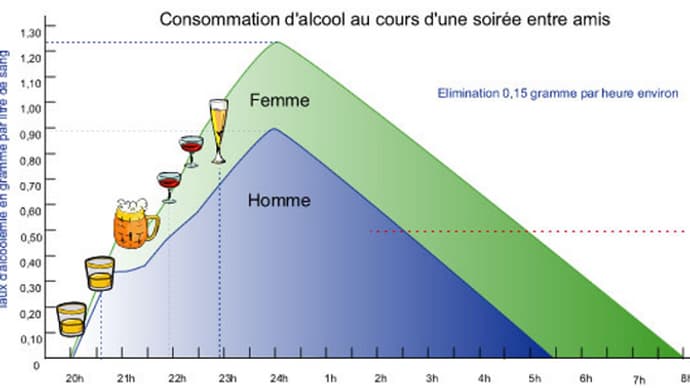A festive moment… but it should not be the last. The Road Safety Association is sounding the alarm as New Year’s Eve approaches with worrying figures from its latest barometer*.
More than 8 in 10 French people plan to celebrate this transition in 2025 and 21% plan to use their own vehicle to get around. However, 78% of those surveyed say they will consume alcohol, with an average of just over three drinks per person.
Accidents most linked to alcohol consumption
So be careful if you take the wheel on the night of December 31 to January 1: in the last 5 years, 17 people have lost their lives on this occasion, according to accident reports from the ONISR (National Interministerial Road Safety Observatory) .
The “alcohol factor” is much more present in accidents during the holiday period, notes the ONISR:
“On the morning of January 1, 2022, 2023 and 2024, three quarters of deaths occurred during an accident in which at least one driver had an alcohol level above the legal limit. This result is above the average for 2023, which amounts to 30%.”
Drug consumption also intervenes after New Year’s Eve, responsible for 40% of deaths, compared to 18% for the entire year.
Inadequate solutions to forget
A well-known problem, but one that the French do not always have the right reflexes to face. “For another year, 68% of concerned French people suggest inappropriate solutions to get home after drinking, such as waiting a while before getting behind the wheel, taking small roads or driving slowly,” Prévention Roadway underlines in its statement.
“Misconceptions that reflect a lack of understanding of the dangers of driving under the influence of alcohol,” the association continues.
Wait, why not? But almost one in two French people (49%) do not know how long it takes to eliminate a glass of alcohol. For each glass consumed, one to two hours are needed, remembers the association.
The graph below shows the absorption and elimination curve of alcohol in men and women (0.15 g per hour) with the red line representing the legal rate, 0.5 g of alcohol per liter of blood.
The ideal remains to anticipate the return at night, a point on which the Prévention Road association insists with its #GoodReturn campaign.
Suggested solutions:
- appoint a night captain in advance,
- use public transport or book a taxi or VTC.
- You can also plan to stay overnight or take a breathalyzer test before getting behind the wheel.
You also have to take care of your own: 24% of French people admit to having seen a guest return to the road having exceeded the authorized alcohol level.
*Survey by the Prévention Routière association carried out online by Moaï, from November 25 to December 6, 2024, among 1,000 French people who constitute a representative sample of the French population aged 18 or over.
Source: BFM TV


